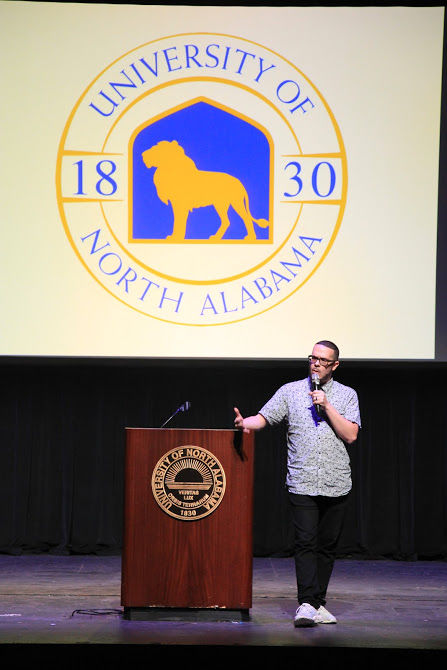King: We live in a very peculiar time in American history
September 11, 2018
Journalist, historian and activist, Shaun King, spoke to an audience at UNA in Norton auditorium Sept. 6. King touched on topics, such as the recent Nike protests, prison reform and “Black Lives Matter.”
“If you didn’t already know it,” King said. “We live in a very peculiar time in American history. Now, if you didn’t know that, I’m concerned.”
King based his presentation on how humanity has progressed to where it is today.
“It’s hard to know a moment of history when you’re in it,” King said.
King said he always finds himself going back to the lessons he learned in college now more than ever.
He used the example of German historian, Leopold von Ranke, who is credited for being the founder of the study of history. Von Ranke is the first person to put together a chronological timeline of human history.
King reiterated throughout the presentation the idea von Ranke had about human nature. He said von Ranke had the idea humans would progressively get better over time, but found that was not the case.
“If we’re steadily getting better and better and better, then that would mean that, right now, we, all of us, not just Trump, all of us,” King said. “We would be the best this world has ever seen. If that’s true, I’m very concerned.”
He said humans would crash, then recover.
“Sometimes humans are amazing,” King said. “Sometimes humans are awful.”
King listed examples of how humans have not gotten “better and better” over time to the audience.
“If we’ve gotten better,” King said. “How do you explain the Trans-Atlantic Slave Trade, the Holocaust, the Rwandan genocide, the bomb that hit the Yemen schoolbus three weeks ago, the prison population?”
He transitioned into the prison population and the topic of prison reform. He said the prison system is not broken, but the system is operating how it was designed to operate.
“The United States currently incarcerates more people than any country in the history of the world,” King said.
King circled back around to the work von Ranke did by explaining the flaw in his hypothesis.
“He confused the steady improvement of technology with the steady improvement of humanity,” King said.
King said von Ranke had a hard time knowing what happened in human history and related it to the current “fake news” trend.
“We have actual fake news now,” King said. “A house cannot burn down by burning a Nike shoe. That story is not real.”
He said he thinks 2018 will go down as a deeply disturbing year in history.
“This has been the deadliest year for police brutality and has the highest number of hate crimes,” he said.
King used a PowerPoint slide to explain what he refers to as “the dip” in history.
“Most people assume they will get out of the dip in their lifetime,” King said. “But most times it takes hundreds of years.”
When the status quo is disrupted for the primary people in power, there will be a dip, King said.
He said slavery and the Civil War, the Civil Rights Movement and Barack Obama’s presidency caused dips in the past.
“Trump is not the cause of our current dip,” King said. “But he causes us to stay in it. It would almost be a stretch to say we aren’t in a dip.”
During King’s presentation, he talked about the “Black Lives Matter” movement and the deaths leading up to it.
“We have a serious problem of police violence in the United States,” he said.
King wrote a Facebook post about the death of Eric Garner in 2014. He came to know the families of Garner, Tamir Rice and Mike Brown. He said he regrets telling the families they will get justice for the deaths of their loved ones because justice was never given.
During the Q&A with the audience, gave his views on “black on black” crime.
“Almost all crime is interracial,” he said. “And yet, only one has a popular name.”
King also discussed his thoughts on the recent Nike campaign and more in-depth about prison reform during the Q&A.
“There are bipartisan solutions to our problems,” King said. “We just hate each other too much to find one.”












